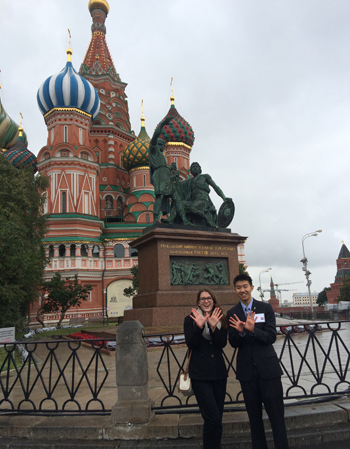Two Rice undergraduate students participated firsthand in cultural diplomacy when they traveled to Moscow in early September as delegates for the Stanford U.S.-Russia Forum, a program founded in 2008 by students, for students. The program, which goes by the acronym SURF, brings 20 American and 20 Russian undergraduate and graduate students together every year to explore pressing policy, business and economic issues and to foster relations between the two countries’ top students.

Kira Clingen and Tim Wang flash the Owl sign while visiting St. Basil's Cathedral in Moscow's Red Square.
For Kira Clingen, a Duncan College senior, and Tim Wang, a Hanszen College junior, participation in the highly selective program has been eye-opening.
“This experience … has strengthened my interests in further exploring social research and public policy,” said Wang, who is double-majoring in biochemistry and cell biology and in history. “Working in international policy is definitely something that I am considering as a field of work post-Rice.”
At the weeklong Moscow conference, the students created 10 groups for collaborative research projects on topics of importance to both countries, including energy geopolitics, biosecurity, Asia and the indigenous peoples of Russia and the U.S. Over the next few months, each group will work with professional and academic mentors and public and private sector stakeholders to produce a report to present at a conference at Stanford University in April.
“The forum was the perfect — and one of the only — ways I felt I could synthesize the coursework I’ve completed at Rice into a practical deliverable,” Clingen said of her motivation to apply for the program. She is triple-majoring in ecology and evolutionary biology, Asian studies and policy studies.
“My research project combines ecology, Russian language skills and environmental policy analysis, subjects which have shaped my time at Rice,” Clingen said. “Having taken Russian at Rice for three years with (Senior Lecturer of Russian) Jonathan Ludwig, I saw a very compelling opportunity to use my language skills on an international team. In the arena of international relations, discussions of rising U.S.-Russian tensions are increasingly held, and this forum is an interesting and productive lens to view those tensions.”
Delegates met with influential experts in a variety of fields. In Moscow they met with Russian Deputy Prime Minister Arkady Dvorkovich and U.S. Ambassador to Russia John Tefft. They visited the Russian Foreign Ministry and many other institutions in Moscow and in Tyumen, Siberia, where they spent part of the week.
As a member of an Arctic and environment working group in SURF, Clingen is on an interdisciplinary team with three graduate students, one from the U.S. and two from Russia. “Our research topic focuses on adaptation and mitigation to climate change in national parks in both the U.S. and Russia, looking at ways to translate intense nationalistic pride in these preserved areas into an arena for collaboration and management cooperation,” Clingen said. “We will be conducting interviews in both Russian and American national parks, looking at initiatives for sustainable forestry and looking at previous policy initiatives within both countries.”
In his biosecurity working group, Wang is working with a Russian sixth-year medical student, Elena Miroshnichenko. “Our project focuses on biosecurity in both the U.S. and Russia,” Wang said. “In particular, we are looking at the role of media in social awareness about biosafety issues.”
The topic is of special interest to Wang. During his first two years at Rice, he conducted microbiology research in the lab of Yousif Shamoo, vice provost for research and professor of biochemistry and cell biology. There he studied antibiotic resistance in hospital pathogens as part of the Century Scholars Program.
For more information about SURF, go to https://usrussia.stanford.edu.


Leave a Reply